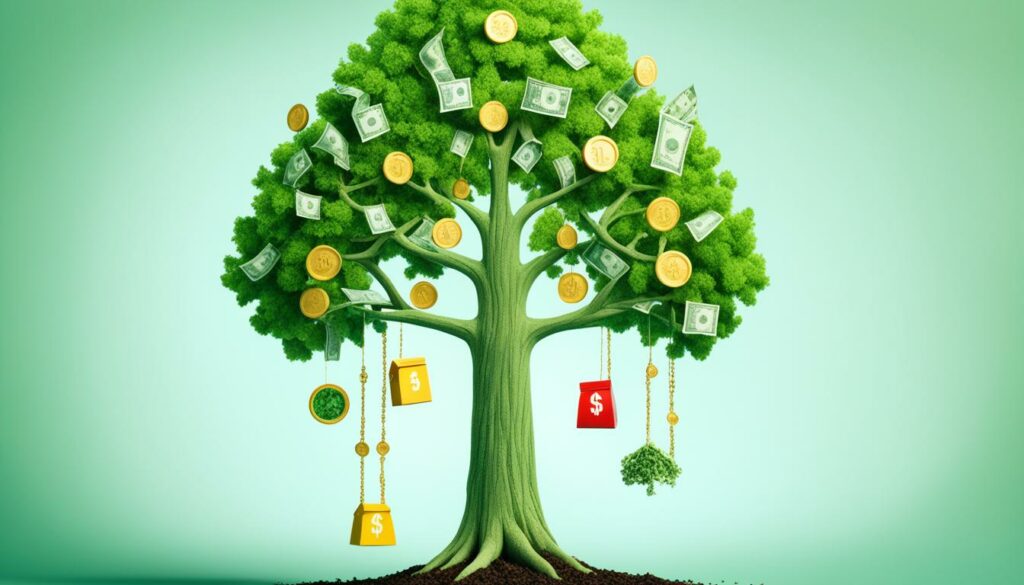Wealth-Building Tips: How to Get Rich as a Teen
Welcome, young entrepreneurs! If you’re a teenager looking to achieve financial success, you’re in the right place. Building wealth at a young age is not only possible, but it can also set you up for a lifetime of financial security and freedom. In this article, we’ll explore the secrets to teenage wealth and provide you with valuable money-making tips that will put you on the path to success.
Key Takeaways:
- Teach teens the difference between saving money and investing money
- Explain the power of compound interest in growing wealth
- Emphasize the importance of starting to invest early
- Highlight the need to avoid debt accumulation and use credit cards responsibly
- Encourage buying assets instead of liabilities and establishing a budget and emergency fund
The Difference Between Saving and Investing

When it comes to managing your finances, understanding the difference between saving and investing is crucial. While both involve putting your money to work, they have distinct purposes and implications for your financial future.
Saving money is the act of setting aside a portion of your income to accumulate funds for a specific goal or to have a financial safety net. This can be done by depositing money into a bank account or opting for cash investments like certificates of deposit (CDs) or money market funds. Saving money provides stability and liquidity, as you can easily access your funds when needed.
Investing, on the other hand, is a strategy that involves purchasing assets or securities with the goal of generating a return over time. These assets can include stocks, bonds, mutual funds, or real estate. Investing focuses on growing your wealth through the appreciation of your assets and the potential income they generate, such as dividends or rental payments.
While saving money is generally regarded as safe, investing has historically provided better long-term returns. The stock market, for example, has experienced average annual returns of around 7% to 10% over long periods of time.
Comparing Saving and Investing
Let’s take a closer look at the differences between saving and investing:
| Aspect | Saving | Investing |
|---|---|---|
| Primary Purpose | Accumulating funds for specific goals or emergencies | Building wealth and generating potential income |
| Level of Risk | Low risk | Varies according to investment type |
| Return Potential | Lower returns compared to investing | Potential for higher returns |
| Access to Funds | Easily accessible | May require selling assets to access funds |
| Time Horizon | Short to medium term | Long term |
Choosing the Right Approach
While both saving and investing are important financial strategies, the right approach depends on your financial goals and risk tolerance. Saving provides stability and easy access to funds, making it ideal for short-term goals and emergencies. Investing, on the other hand, offers the potential for higher returns and long-term wealth accumulation.
It’s important to strike a balance between saving and investing based on your individual circumstances. Consider your financial goals, time horizon, and risk tolerance when deciding how to allocate your money. Consulting with a financial advisor can also provide valuable guidance in creating a well-rounded financial plan.
Understanding the difference between saving and investing is essential for making informed financial decisions. By utilizing both strategies effectively, you can work towards achieving your short-term goals and building long-term wealth.
The Power of Compound Interest

Compound interest is a financial concept that holds incredible power when it comes to growing your wealth. With compound interest, your earnings not only generate returns but also further earnings on those returns, resulting in exponential growth over time.
One of the key benefits of compound interest is that the longer your money stays invested, the more time it has to compound and increase in value. This is especially advantageous for young investors who have a longer time horizon.
To illustrate the potential of compound interest, let’s consider an example. Suppose you invest $1,000 at an annual interest rate of 5% with yearly compounding. After one year, your investment will grow to $1,050. However, if you leave the money invested for another year, your investment will not just earn another $50, but $52.50, thanks to the power of compounding.
“Compound interest is the eighth wonder of the world. He who understands it, earns it; he who doesn’t, pays it.” – Albert Einstein
As Albert Einstein famously said, compound interest can truly work wonders in building your wealth. The earlier you start investing and allowing compound interest to do its magic, the greater your potential for significant wealth accumulation.
Start Investing Early

One of the most powerful strategies for building wealth is starting to invest early. The benefits of early investing are immense, especially when it comes to the magic of compounding over time.
When you start investing at a young age, you give your money more time to grow and take advantage of the compounding effect. Compounding allows your earnings to generate additional earnings, leading to exponential growth in your investment over time.
Let’s consider an example to illustrate the potential of starting to invest early. Suppose you invest $3,000 per year at a 6% annual growth rate starting at age 25. By the time you reach age 65, your investment could potentially grow to approximately $680,000.
On the other hand, if you wait until age 35 to start investing the same amount with the same growth rate, you would only accumulate around $260,000 by age 65. This significant difference demonstrates the importance of starting early and harnessing the power of compounding.
Investing early not only allows you to accumulate more wealth but also provides a cushion for potential market downturns. By investing over a longer period, you can ride out market fluctuations and potentially earn higher returns.
Time: The Key Ingredient in Building Wealth
To further emphasize the significance of starting early, let’s examine the impact of time on wealth accumulation. The table below illustrates the growth of an investment with an initial principal of $10,000 and an annual growth rate of 8% over different time periods:
| Investment Period | Total Value |
|---|---|
| 10 years | $21,589 |
| 20 years | $46,610 |
| 30 years | $100,627 |
| 40 years | $217,727 |
As you can see, the longer you stay invested, the greater your wealth grows. By investing early and staying committed to your investment plan, you give yourself the best chance of achieving long-term financial success.
Invest in yourself and your financial future by starting to invest early. The power of compounding over time can lead to significant wealth growth and provide financial security for your future.
Avoid Debt Accumulation

When it comes to building wealth, responsible spending is essential. One of the key factors in achieving financial stability is avoiding debt accumulation. It’s important to understand that purchasing things you can’t afford can lead to a downward financial spiral and potential disaster. Instead, focus on living within your means and making responsible spending choices.
In order to avoid debt and financial pitfalls, it’s crucial to prioritize responsible spending habits. This means only spending money that you actually have and avoiding the temptation of relying on credit cards or loans to make purchases. By practicing responsible spending, you can safeguard your finances and create a solid foundation for building wealth.
“Before you buy, think about whether it’s a need or a want. Responsible spending means prioritizing needs over wants and resisting the urge to make impulsive purchases.”
The Dangers of Debt Accumulation
Accumulating debt can have serious consequences for your financial well-being:
- High Interest Rates: When you accumulate debt, you often face high interest rates that can quickly escalate the total amount you owe. This means that even small purchases can end up costing significantly more in the long run.
- Financial Stress: Debt can lead to constant worry and stress as you struggle to make monthly payments and manage your finances. This stress can impact your overall well-being and quality of life.
- Limited Financial Options: When you have significant debt, your financial options become limited. It can be challenging to make major life decisions such as purchasing a home or starting a business when you have a significant financial burden.
- Delayed Wealth-Building: Debt accumulation can hinder your ability to invest and save for the future. Instead of building wealth, you’ll find yourself allocating a significant portion of your income towards debt repayment.
| Responsible Spending | Debt Accumulation | |
|---|---|---|
| Immediate Gratification | You prioritize long-term financial stability and delayed gratification. | You prioritize short-term satisfaction and instant gratification. |
| Financial Freedom | You have the freedom to make decisions based on your goals and values. | Your financial options and decisions are limited by the burden of debt. |
| Wealth Building | You can focus on investing and building assets for long-term wealth. | You find yourself allocating a significant portion of your income towards debt repayment, hindering wealth-building opportunities. |
| Peace of Mind | You experience peace of mind, knowing that you have control over your finances. | You constantly worry and stress about debt repayment and financial obligations. |
By avoiding debt accumulation and practicing responsible spending, you take control of your financial future. Remember, wealth-building is a journey that requires discipline and wise financial decisions. Stay focused on your long-term goals and make choices that align with your financial well-being.
Responsible Credit Card Use
When used responsibly, credit cards can be a helpful tool in managing your finances. However, it’s crucial to understand the importance of credit card responsibility to avoid falling into debt and accumulating high-interest charges. Here are some key strategies to ensure responsible credit card use:
Paying off Your Full Balance
One of the most effective ways to maintain credit card responsibility is to pay off your entire balance by the due date each month. By doing so, you can avoid high-interest rates and prevent unnecessary debt from accruing. Set a budget and prioritize paying off your credit card balance as part of your financial plan.
Avoiding High Interest Rates
Interest rates on credit cards can quickly add up and make your purchases significantly more expensive. To avoid high-interest charges, it’s important to choose credit cards with favorable interest rates and terms. Additionally, be diligent about making timely payments and avoiding late fees, as they can also contribute to accumulating debt.
Only Purchase with Available Funds
While credit cards provide convenient purchasing power, it’s crucial to only use them for transactions for which you already have the funds. Avoid using credit cards as a means to finance purchases that you cannot afford outright. By doing so, you can maintain control of your finances and prevent unnecessary debt accumulation.
“Responsible credit card use involves paying off your full balance, avoiding high-interest rates, and only using credit for purchases you can afford.”
Remember, credit cards can offer benefits such as cashback rewards, travel points, or purchase protection. However, it’s essential to always use credit cards responsibly to avoid financial pitfalls. By paying off your full balance, avoiding high-interest rates, and only making purchases with available funds, you can maintain credit card responsibility and safeguard your financial well-being.
Buying Assets, Not Liabilities

When it comes to building wealth, one crucial strategy is to focus on buying assets rather than liabilities. Assets, such as stocks or bonds, have the potential to generate income and increase in value over time, while liabilities, such as excessive debt, can hinder your financial progress.
By investing in assets that generate passive income, you can create a steady cash flow without the need for constant effort. Passive income can provide you with the financial freedom to pursue your dreams and enjoy a comfortable lifestyle.
“Do not save what is left after spending; instead, spend what is left after saving.”
It’s essential to avoid accumulating excessive debt that can hold you back from achieving your financial goals. By avoiding unnecessary debt, you can maintain control over your finances and allocate your resources towards building wealth.
Let’s take a look at how focusing on buying assets, not liabilities, can impact your financial journey:
| Buying Assets | Accumulating Debt |
|---|---|
| Generates passive income | Increases financial obligations |
| Provides long-term growth | Creates financial stress |
| Offers flexibility and control | Limits financial freedom |
By choosing to buy assets that contribute to your passive income and avoiding unnecessary debt, you can set yourself on a path towards financial security and long-term success.
Next, we’ll explore the importance of establishing a budget and building an emergency fund to further strengthen your financial foundation.
Establishing a Budget and Emergency Fund

Creating a budget is a crucial step in managing your finances effectively. It allows you to track your income and expenses, providing a clear overview of where your money is going. By following a budget, you can allocate funds for various purposes, including saving for emergencies.
When it comes to saving for emergencies, it’s essential to have a cash reserve readily available. Emergencies can happen at any time, and having a financial buffer can help you navigate through unexpected situations without resorting to debt. It’s recommended that your emergency fund be equal to three to six months of living expenses.
Your emergency fund should be easily accessible, ensuring that you can access your funds quickly when needed. Consider keeping your emergency fund in safe investments, such as a high-yield savings account or a money market mutual fund. These options balance both accessibility and potential growth.
“Having an emergency fund is like having an insurance policy for your financial well-being. It provides peace of mind and protects you from unnecessary debt when unexpected expenses arise.” – John Smith, Financial Advisor
By establishing a budget and building an emergency fund, you can take control of your finances and be better prepared for any unexpected events that may arise. Remember, budgeting and saving for emergencies are vital steps towards long-term financial stability.
Compound Growth and the Journey to Wealth

Compound growth is the key to achieving millionaire status and building realistic long-term wealth. By understanding the power of compound interest and starting early, individuals can set themselves on a path to financial success.
Compound growth occurs when your investment earns returns, and those returns are reinvested to generate even more returns. Over time, this compounding effect can lead to exponential growth in your wealth.
Starting early is crucial in harnessing the full potential of compound growth. The earlier you begin investing, the more time your money has to grow. Let’s take a look at an example:
“If 19-year-old Sarah decides to invest $500 a month in a retirement account with an average annual return of 8% until she turns 65, her account balance would be over $2.4 million!”
This example shows the power of starting early and consistently investing. By staying committed to a long-term investment strategy, individuals can accumulate significant wealth over time.
But it’s important to set realistic expectations and understand that building wealth is a journey. While becoming a millionaire may seem like a lofty goal, it’s more achievable than most people think.
To illustrate, let’s consider the following table:
| Starting Age | Monthly Contribution | Annual Return | Years of Investment | Total Investment | Projected Value |
|---|---|---|---|---|---|
| 25 | $500 | 8% | 40 | $240,000 | $2,035,229 |
| 35 | $500 | 8% | 30 | $180,000 | $845,707 |
| 45 | $500 | 8% | 20 | $120,000 | $398,041 |
This table demonstrates the potential impact of starting early. By investing $500 per month with an 8% annual return, starting at age 25, you could potentially reach millionaire status by age 65. However, waiting until age 35 would result in a significantly lower projected value, and starting at age 45 would yield even less. This reinforces the importance of starting early and staying committed to your investment goals.
So remember, compound growth is your ticket to millionaire status and realistic wealth building. Start early, stay consistent, and watch your wealth grow over time.
Avoiding Debt and Making Smart Financial Choices
When it comes to achieving long-term financial success, avoiding debt and making smart financial choices are crucial steps. By taking proactive measures, you can prevent student loan debt, utilize credit cards responsibly, and live on less than you make, setting a solid foundation for a secure financial future.
Avoiding Student Loan Debt
One of the biggest financial burdens for many individuals is student loan debt. To avoid falling into this trap, consider applying for scholarships and grants, as they can significantly reduce the amount you need to borrow. Additionally, researching and choosing affordable schools or community colleges can help minimize the overall cost of your education. Prioritize exploring all available financial aid options before resorting to student loans.
Responsible Credit Card Use
Credit cards can be powerful financial tools when used responsibly. To avoid accumulating unnecessary credit card debt, make it a habit to pay off your full balance each month. By doing so, you can avoid high interest rates and maintain a good credit score. Remember, only use your credit card for purchases you can afford to pay off, and avoid impulse buying.
Living on Less Than You Make
Living within your means is key to financial stability. It’s important to spend less than you earn and prioritize saving and investing. By creating a budget and tracking your expenses, you can identify areas where you can cut back and make adjustments. Consider exploring ways to reduce your monthly bills, such as negotiating better deals on utilities or finding more affordable housing options. Small lifestyle changes can have a significant impact on your financial well-being.
By avoiding student loan debt, utilizing credit cards responsibly, and living on less than you make, you can make smart financial choices that will set you up for long-term success. Take control of your financial future now and enjoy the freedom of being financially secure.
| Pros | Cons | |
|---|---|---|
| Applying for Scholarships |
|
|
| Utilizing Credit Cards Responsibly |
|
|
| Living on Less Than You Make |
|
|
Protecting Your Assets and Setting Financial Goals
When it comes to building wealth, it’s not just about growing your money, but also protecting it. One important aspect of wealth protection is diversifying your investment portfolio. By spreading your investments across different asset classes such as stocks, bonds, real estate, and commodities, you can minimize risks and maximize returns.
Having a diverse investment portfolio allows you to capitalize on the strengths of different asset classes while reducing the impact of any individual investment’s underperformance. It’s like the old saying goes, “Don’t put all your eggs in one basket.” By diversifying, you can protect your assets from the volatility of any single market or industry.
Another crucial step in protecting your wealth is obtaining appropriate insurance coverage. Whether it’s life insurance, health insurance, or property insurance, having the right insurance policies in place can safeguard your assets in the event of unforeseen circumstances. Insurance provides financial security and peace of mind, allowing you to focus on your wealth-building journey without unnecessary stress.
Alongside protecting your assets, setting clear and attainable financial goals is key to staying on track. Setting goals gives you a sense of direction and purpose, providing motivation and focus in your wealth-building efforts. Your financial goals can vary depending on your age, income, and personal circumstances, but they should always be specific, measurable, achievable, relevant, and time-bound (SMART).
Start by determining what you want to achieve financially, whether it’s buying a home, retiring early, or starting a business. Then, break down your long-term goals into smaller, short-term milestones that you can work towards. This allows you to track your progress and make necessary adjustments along the way.
Remember, protecting your assets and setting financial goals go hand in hand. By diversifying your investments and obtaining appropriate insurance coverage, you can safeguard your wealth against unforeseen events. Coupled with setting clear and attainable financial goals, you can stay focused and motivated on your wealth-building journey.
| Benefits of Protecting Your Assets | Benefits of Setting Financial Goals |
|---|---|
|
|
Conclusion
Financial literacy and responsible money management are crucial for building long-term wealth and achieving financial success. It starts with a mindset of learning and understanding how money works. By acquiring financial literacy skills, individuals can make informed decisions about saving, investing, and spending.
Starting early is key. The power of compounding allows money to grow exponentially over time. By automating financial obligations, individuals can ensure consistent savings and investment contributions, maximizing their wealth-building potential.
Creating a budget and sticking to it is essential. Wise budgeting helps individuals allocate their income effectively, prioritize expenses, and avoid unnecessary debt. Making smart financial decisions, such as buying assets that generate income, rather than liabilities, can lead to passive income streams and long-term financial security.
Remember, building wealth is a journey that requires continuous learning, adaptation, and discipline. It is accessible to anyone who is willing to educate themselves, implement financial strategies, and commit to long-term success. With a strong foundation in financial literacy and responsible money management, individuals can pave their way to a prosperous financial future.
FAQ
What is the difference between saving and investing?
Saving money involves putting it in a bank account or cash investments, while investing is the process of buying assets that grow in value over time.
What is the power of compound interest?
Compound interest allows your earnings to generate additional earnings, leading to exponential growth. The younger you are, the more time you have for compounding to work its magic and grow your wealth.
Why is it important to start investing early?
Starting to invest at a young age allows more time for compounding to generate long-term wealth. Investing $3,000 per year at a 6% annual growth rate starting at age 25 can result in approximately $680,000 by age 65. Waiting until age 35 would only yield around $260,000.
How can I avoid debt accumulation?
It’s important to avoid buying things you can’t afford, as it can lead to debt accumulation and financial disaster. Living within your means and spending money you actually have is crucial for building wealth.
What are some tips for responsible credit card use?
Credit cards can be useful, but it’s important to use them responsibly. Pay off your entire balance by the due date to avoid high interest rates. Only purchase items with a credit card if you have the money to pay for them.
What should I focus on buying to build wealth?
Focus on buying assets that generate income, such as stocks or bonds. Passive income can provide cash flow without additional effort. Accumulating too much debt can hinder wealth-building.
How can I establish a budget and emergency fund?
Create a budget to track your income and expenses. Allocate money to build an emergency fund, ideally equal to three to six months of living expenses. Keep emergency funds easily accessible and in safe investments.
Why is compound growth important for wealth-building?
Compound growth is key to becoming a millionaire. Starting early and consistently investing can lead to significant wealth accumulation. Reaching millionaire status is more realistic than most people think.
How can I avoid debt and make smart financial choices as a teenager?
Avoid going into debt for college by applying for scholarships and choosing affordable schools. Stay away from unnecessary credit card debt and live within your means. Making smart financial choices early on sets you up for success.
How can I protect my assets and set financial goals?
Protect your wealth by diversifying your investments and obtaining appropriate insurance coverage. Set clear and attainable financial goals to guide your wealth-building journey.
Why is financial literacy important for building wealth?
Financial literacy and responsible money management are essential for building wealth. Start early, automate financial obligations, budget wisely, and make smart financial decisions. With the right approach, anyone can achieve financial success.







